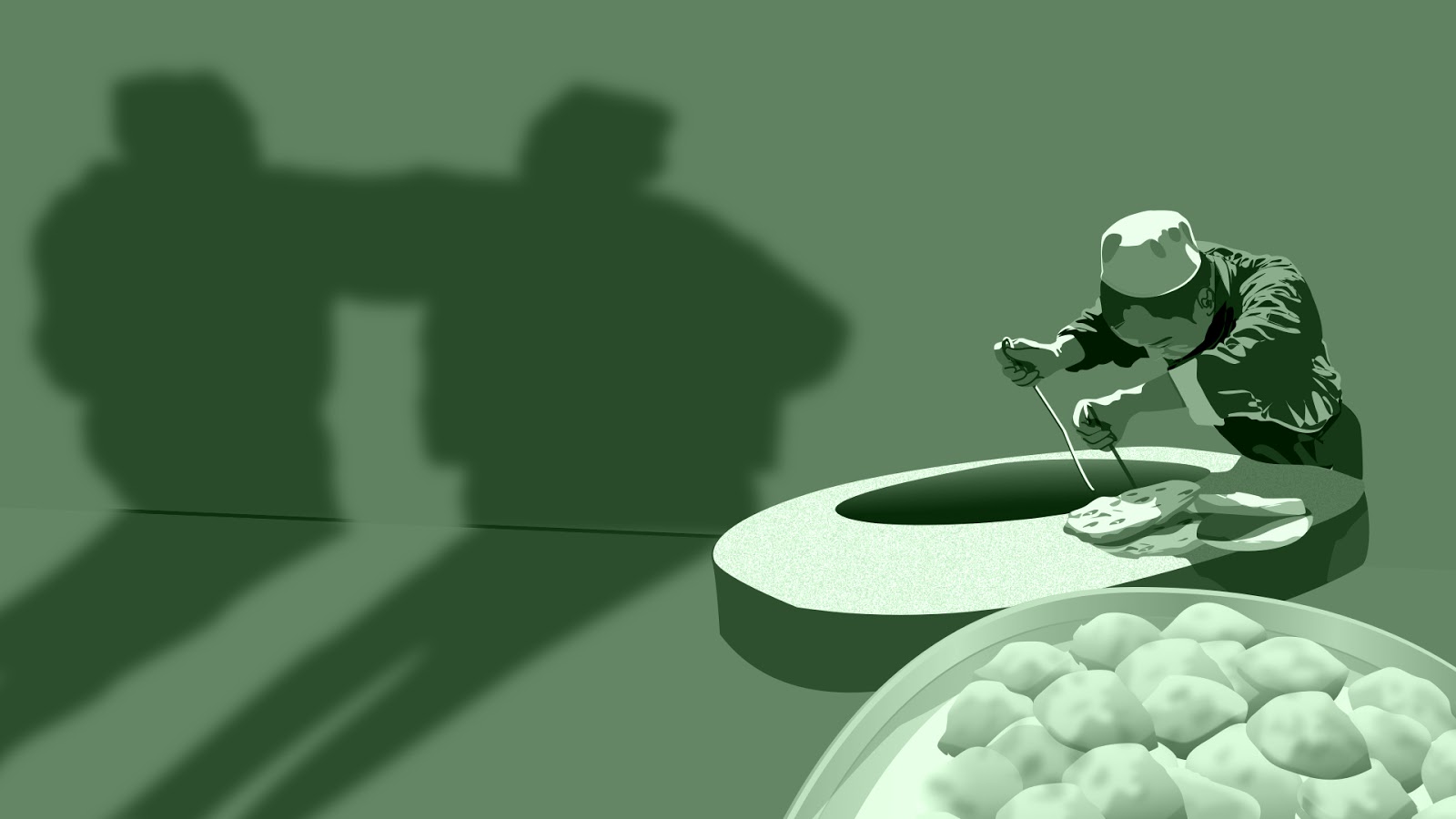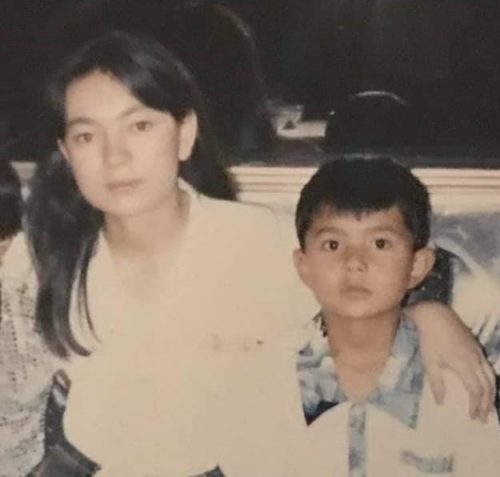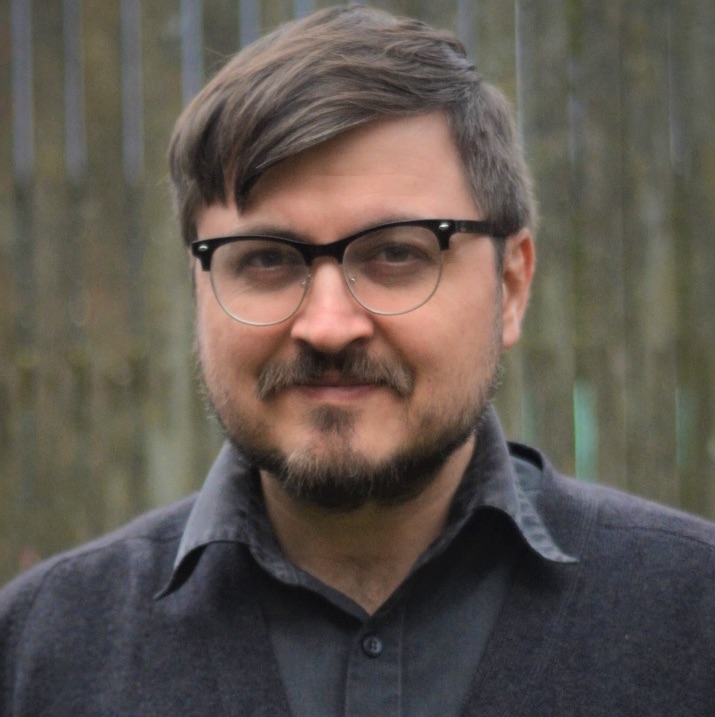Uyghur ‘caretaking’ and the isolation of reeducation
In Uyghur society, lending money is more than capital exchange, it's part of a practice that social theorist AbdouMaliq Simone refers to as “taking care.” In Xinjiang, as China's "People's War on Terror" accelerated, money transfers across international boundaries were seen as a possible sign of extremism — just another way that Uyghurs were cut off from their support networks and isolated from one another.

In 2015, a young baker named Yusup taught me the Uyghur concept of “caretaking”(Uy: qarimaq). I had been hanging out with him and his closest friend, Nurzat, a fellow migrant from Yusup’s home village near Kashgar, walking the bazaars and talking about life. They taught me how to eat piping hot baked dumplings called samsa without burning your mouth. The trick was to bite off one corner to release the steam, then hold the opened end up so you wouldn’t get seared by the lamb and onion broth as you nibbled. In a rush to pay the bill, they held back each other’s outstretched arm in an awkward dance, competing to pay the 20 yuan ($3) for the half-dozen dumplings.
They referred to each other as “life and liver” friends (Uy: jan-jiger dost) — a type of heterosexual male friendship defined by, metaphorically, the same liver, an organ thought to carry the essence of a person’s life. Like soul mates and blood brothers, they ate many of their meals together, shared the same values, and protected each other. They had dropped out of school during middle school, since their families couldn’t afford to feed and educate them. As a result, they had very limited knowledge of Chinese, but a deep understanding of Ürümchi alleyways. They had been sent to work as bakery apprentices in the city by their families — a hard but stable life path that taught them a trade and how to hustle. Both of them left their respective bakeries after kneading dough and baking naan and samsa for 12 hours per day for several years. They said their bosses treated them like slaves. They wanted real jobs where they could work when they needed money and quit if it got too hard. They wanted to be in charge of their own lives. They bounced from job to job, selling belts in the market, standing around in security guard uniforms, and working as waiters in Uyghur restaurants.
One day Yusup told me he had lost his job after getting in a fight with a coworker about her handwriting. “When she would write the table number on the receipt, I often couldn’t read it clearly, so I would ask her which number it was — for example, if it was a 6 or a 9. This made her really upset because she felt like she was writing the numbers really clearly and that I was just ignorant. Our manager always chose favorites. So I was the one who was asked to leave.”
The incident really bothered Yusup, both because he felt he had been treated unfairly due to his education status and because he no longer had an income. “After it happened, I spent two whole days just walking and thinking to myself about what happened,” he said with a sigh. “Now I don’t have any money. My rent is due in three days. It is 350 yuan ($50). I could ask my cousin’s family for help. I haven’t told them that I lost my job, and I definitely haven’t told my family back in [my village]. I can only tell my friends. My life is so difficult.”
At the same time, he seemed a bit relieved because it meant that he finally had some time off. After working six or seven days a week for nearly six months, he was ready for a break. His plan at the moment: “Rest well for one week and then find another job. I don’t care what it is. I will just borrow money from friends until I find a job.”
Nurzat lent him the little money he had and Yusup worked out a deal to pay the rest of the rent to his landlord later in the month.
Over the months that I spent with Yusup, he had half a dozen different jobs. He tried them out. Then quit. And then turned to his friends for support. The flow of money between friends was constant.
Over time, I became one of those friends, too. Over meals of al dente Ghulja-style pulled noodles, Yusup sometimes asked me to loan him 200 yuan ($30) to help him pay his rent or buy a suit for an upcoming wedding and his regular single set of clothes would not do. I learned from observing Nurzat that when these requests were made, the response should be to immediately give as much money as one could as a gift without asking any questions.
I came to understand that monetary exchange was a way of building the intimacy of a relationship. By making oneself vulnerable and asking for money, the borrower showed how much they trusted their friend or relative. The lender likewise showed their care by giving money as a gift, while also reaffirming their trust in the borrower since they knew the favor could be returned. Lending money was a way of caring for friends and loved ones. Exchanging money was more than capital exchange, it was part of a practice that social theorist AbdouMaliq Simone refers to as “taking care.” The act of taking gifts gave them a feeling of protection in an otherwise uncertain life.
In May 2015, the police in Nurzat’s home village demanded that he return home and apply for a new Xinjiang-specific “convenient for the people” passcard, without which he could not freely migrate. But try as he might, Nurzat was never granted this card. Yusup tried to make it on his own in the city for a few more months, but then he too gave up and returned to the village. In late 2016, my communications with him went dark. Because of their age, employment, internet habits, and education status, it is likely that both he and Nurzat were sent to their local reeducation camp. I don’t know where either of them are now.

Yusup and Nurzat were forced to depend on each other, rather than their parents or siblings, for financial support partly due to the deep poverty of their families. This poverty, and its intensification in the 1990s and 2000s, also had something to do with the way Uyghurs were often systematically denied credit and access to good jobs. This had the effect of increasing indebtedness and dependency among Uyghurs who were systematically blocked from low interest lines of credit by national banks. Uyghur migrants told me and other researchers that Han landlords, bankers, and neighborhood officials increasingly found ways of evicting Uyghur business owners or homeowners and replacing them with Han settler tenants. Many Uyghur migrants I interviewed told me they encountered prejudice when seeking loans or authorizations of sales and purchases. Banks and landlords were often quite eager, on the other hand, to provide Han settlers with loans for purchases of real estate or discounts on business investments.
Over time, more and more aspects of interpersonal care were criminalized, as Uyghurs were blocked from financial services and loaning money to each other.
As the “People’s War on Terror” was set in motion in 2014, new restrictions on money transfers and bank withdrawals forced Uyghurs to rely on informal loans to a greater and greater extent. Migrants to the city depended on each other and, if their parents could afford it, sent food to them through a Uyghur-specific parcel-delivery network. These gifts of bread, meat, and fruit sustained migrants both materially and spiritually. The recipients of these packages said things like:
Of course I could buy those raisins and naan in the bazaar here in Ürümchi, but it’s not the same thing as receiving something from your own mother. It is a way for our parents to show us that they care. For many of us, our parents are simple people who don’t have much on their mind except for a few things: the health of their children and saving enough money for the holidays. It is so nice to receive those boxes. Even though I have lived in the city for such a long time now, my mom still asks me all the time if I need anything from my village in Kashgar prefecture.
A Uyghur businessman named Mahmoud told me in 2015 that Uyghur entrepreneurs were often forced into marginal industries and locations because they did not have the right connections. For example, Mahmoud said he really only knew one Uyghur real estate developer in Ürümchi. He said that because of the large number of Uyghurs who attempted to buy properties from him, he was forced to bribe local officials and police. He said, “Because properties are bought in advance by Uyghurs, there won’t be the ‘right’ proportion of Han residents in Uyghur-developed properties, so they are forcing him to pay for hundreds of police officers and build large police facilities.” Yet despite these kinds of restrictions, Mahmoud, like other Uyghur entrepreneurs, still believed there were ways for Uyghurs to survive in the Chinese economy. “We have to win them over by showing them what we can do. But it is hard to do this when we are always the target of blame for our feelings and our resentments for all that is wrong with Xinjiang.”
The most difficult aspect of trying to do business was getting the proper certificates and even moving one’s own money around. “If a Uyghur wants to withdraw more than 100,000 yuan ($14,600), he must first get permission from the Public Security Bureau,” Mahmoud said. “They are concerned that the money will be used to fund religious activism.” In 2018, Mahmoud also disappeared into a camp because he used a VPN to open a Facebook account, among other “pre-crimes.”
As I wrote previously in this column, money transfers across international boundaries were also deemed a sign of extremism or terrorism in 2014. Although it took several years for these rules to be fully enforced, over time more and more aspects of interpersonal care were criminalized, as Uyghurs were blocked from financial services and loaning money to each other.

Gulruy Asqar remembers November 4, 2016, as a bright and sunny day. She took a day off from work and went to the Regions Bank in her neighborhood in Tennessee. The bank tellers were friendly, they offered her a coffee while they helped her process a complicated transfer of $9,630.00 to the Xinjiang Branch of the Bank of China — the one next to the big mosque where middle-aged Uyghur men used to stand outside, changing dollars for yuan out of fanny packs. Back in Tennessee, all of that seemed far away. “I never thought for one moment that we were on the brink of such a great tragedy.” Gulruy remembered, “I was in such a good mood. When I came home I went on a walk in my neighborhood. It was such a nice day.”
Several years before, Gulruy and her husband had borrowed nearly $10,000 from her sister in order to help with the down payment on a house in the U.S. Now her sister needed the money back so she could lend it to their brother.
Gulruy addressed the money to her nephew Ekram Yarmuhemmed (艾克热木·亚尔买买提 Àikèrèmù · Yàěrmǎimǎití), since he spoke perfect Chinese and was one of the best people in the family at dealing with Chinese banking bureaucracy. The next day, like usual, Gulruy called her family back in Xinjiang. She told Ekram that the money was on the way. She joked that her sister had actually made money, because the yuan was now worth more than it was in 2015 when they first loaned the money.
It took nearly two weeks for the money to show up in Ekram’s bank account — nearly twice as long as the bank order said it should. “I woke up late,” Gulruy recalled. “Saturdays are the best. I was off work and I always talked to my family on Saturday morning.” But this time she could sense that something was not right. She called, not knowing that just a little before, the police had stormed into Ekram’s apartment with a search warrant. They turned the place upside down. They found an MP3 recording of the Quran. They confiscated the recording and took Ekram away.
After an investigation, Ekram was sentenced to 10 years in prison. Gulruy fears that the money transfer from a foreign source was one of the key forms of evidence used in the case. Since 2017, she, like most other Uyghurs I know, has stopped sending money to family members living in other countries. Caretaking by sharing money within a family has effectively been criminalized.
Remembering that moment, Gulruy said, “My whole family heard me (crying on the phone) and came down. On the line I heard them say, ‘Don’t blame yourself, don’t blame yourself. We know that you have a good heart.’”

But it was impossible for Gulruy not to blame herself. “I was Ekram’s second mom,” she said. “When he was little, I took care of him because my sister was a nurse. Family is everything to us. We were so close. Now he is gone because we cared too much for each other. Right now, at this very moment, I still blame myself. Of course, he could have been targeted no matter what, so I know I should not. But I am human.”
This experience made Gulruy remember a story her father had told her about the Cultural Revolution. “He told me that sometime in the late 1960s he received a letter from his relatives in Kazakhstan.” As a classic Uyghur literature professor he was already regarded as a member of the “stinking number 9” intellectual class and as an “ethno-nationalist” (Uy: milletchi). The letter, a way for relatives to stay in touch across international boundaries, was an additional mark against him. Gulruy’s father remembered that when the Red Guards searched his home and found the letter, they deemed it a sign of a foreign “criminal element” (犯罪分子 fànzuì fēnzǐ). He told Gulruy, “They paraded me through the streets, forcing me to wear the tall paper dunce hat while they taunted me.” Then he was sent to prison for two years and then to a work camp.
Now, nearly 50 years later, families caring for each other were criminalized once again. Gulruy said, “When my sister gave us the money, they insisted that it was just a gift, just a way of helping us start our new life in America. This was just a way of showing that you care for each other. We never make a big deal out of giving money. We Uyghurs have a saying for this, we say that we give it ‘inside the sleeves’ so no one can see it. We always helped each other. For as long as I can remember, I loaned money to my brothers and sisters. If we needed anything, they were the first ones I turned to, not a bank or a stranger. We didn’t expect others to give money like this, especially if it was a bigger amount. It was a way of showing that we believed in each other. My sister trusted me that I would return it, so that she could give it to someone else. This is just how we think about money.”
As the anthropologist Rune Steenberg has shown, there is a long historical Uyghur tradition of “keeping wealth in the family.” In the past, this was often accomplished by marriages that were arranged between relatives, keeping wealth within particular communities. Uyghurs also have an indigenous tradition of microloans within a gendered friendship group or chay circle — a tradition that continued up until at least 2015. Women and men met once per month in a different host’s home, or sometimes a restaurant, bringing a set amount of money that was given to the host. Each time, a different member of the group acted as a host. In this way, friends would help each other to build capital to start small businesses or buy new clothes and wedding gifts. Given the tight restrictions on gatherings and monetary exchange, it is likely that many of these forms of interdependency and intimacy are being lost. Now, Uyghur economic activity centers around government “poverty alleviation” programs, forms of unfree labor which often separate parents from each other and their children.
In his reflections on his time in Auschwitz, the Austrian writer Jean Améry notes that the isolation he felt as the member of a group that had been abandoned by humanity was one of the most dehumanizing aspects of living through “a borderline situation.” This lack of agency and support can make life feel unbearable and unrepresentable. By cutting off Uyghur care networks, the reeducation campaign in Northwest China is producing a similar psychological atmosphere. The isolation of reeducation builds on the structures of poverty and widespread political violence that characterizes the Uyghur 20th century.
For a long period after Ekram was taken away, Gulruy was unable to communicate with her family. In the months that followed, Ekram’s brother was taken too, perhaps because of the MP3 recording of the Quran. Then Gulruy’s brother was also taken, perhaps because he edited a Uyghur-Chinese dictionary of Uyghur place names. More recently, her brother and one of her nephews have been placed under community detention, but they are still watched very closely. By taking away so many of their traditional ways of caring for each other, Ekram, Mahmoud, Yusup, Nurzat, and their families have been isolated. They have become numbers in an indifferent reeducation machine.
The names of Mahmoud, Yusup, and Nurzat have been changed to protect their identities. Darren Byler’s Xinjiang Column will be published bimonthly moving forward, starting in November.






